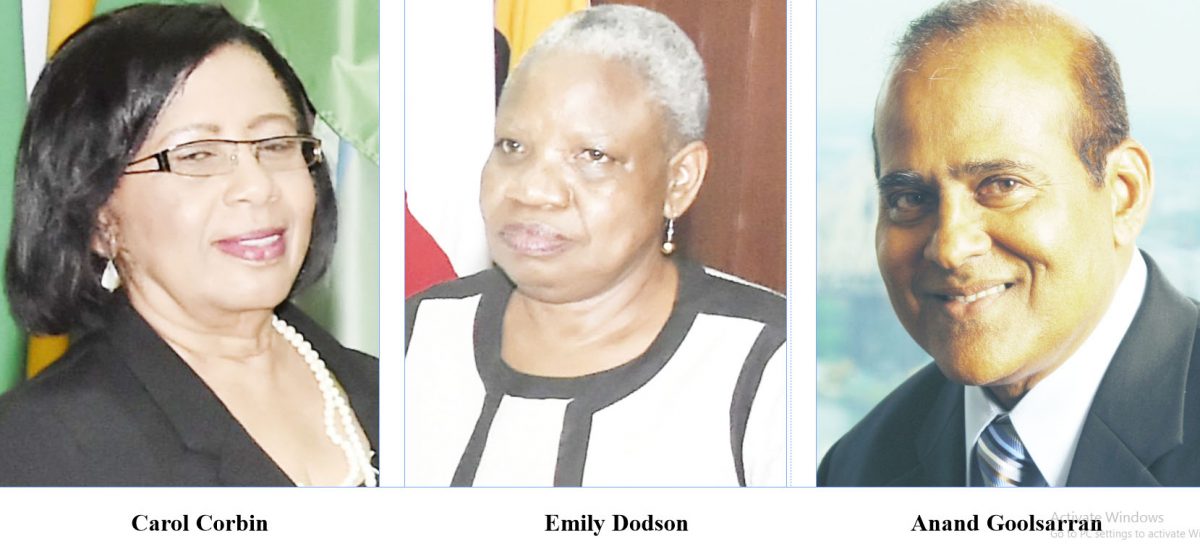The Public Procurement Commission says there is no merit to the Transparency Institute of Guyana Inc. (TIGI) position that the 2016 Production Sharing Agreement (PSA) between the government and ExxonMobil’s local subsidiary violates the public procurement law.
“We are disputing the statement made that the Procurement Act is relevant to the issuing of licences to persons interesting in exploring for petroleum products,” Head of the Public Procurement Commission (PPC) Carol Corbin told Stabroek News in an interview.
“The whole area of issuing of licences for exploration and production is not a procurement of goods and services for government. The Procurement Act governs the procurement of goods services and works by government entities. Now there is a specific Act which governs petroleum exploration and production,” she added while holding the Petroleum Exploration and Production Act.
In its September 4th Stabroek News column, TIGI said it found that the PSA was in breach of the 2003 Procurement Act.
Corbin said that since the article was published, the procurement body noticed the error and was planning a response to bring clarity to the matter.
Former Auditor General Anand Goolsarran also contended that the Act does not cover the granting of petroleum licences.
He explained, “The Procurement Act 2003 deals with the procurement of goods, services and the execution of works. It defines ‘goods’ to include “raw materials, products, equipment and other physical objects of every kind and description, whether in solid, liquid, or gaseous form, and electricity”. Similarly, ‘services’ is defined as “services of a general nature other than consulting and construction services”. ‘Construction’ is defined as “all works associated with the construction, reconstruction, demolition, repair or renovation of a building, structure or works, such as site preparation, excavation, erection, building, installation of equipment or materials, decoration and finishing”.”
“From these definitions, it is evident that the Procurement Act does not cover the granting of exploration licences. We, therefore, need to go to the Petroleum (Exploration and Production) Act of 1986 for guidance. This Act applies to “the exploration, exploitation, conservation and management of petroleum existing in its natural condition in land in Guyana, including the territorial sea, continental shelf and exclusive economic zone of Guyana’,” he added.
Goolsarran pointed out that Chapter 2 deals with the Petroleum Prospecting Licence and assigns the minister a number of actions to be taken in the awarding of licences. “The Minister may: “(a) Invite applications for the grant of a petroleum prospecting licence in respect of the block or blocks specified in the notice; (b) Specify the period within which an application may be made; and (c) Specify the conditions subject to which any application may be made. The Minister may grant, on such conditions as he determines, or refuse to grant, a petroleum prospecting licence in respect of any block or blocks,” he said.
He stressed the number of powers given to the minister and said that they should be revised.
“You will notice that the Minister has enormous powers under the Act which may not accord with the principles of transparency. This needs to be looked at carefully and appropriate recommendations made,” he said.
PPC Commissioner Emily Dodson stated that the process is similar at the Guyana Geology and Mines Commission, when miners get a block. “The GGMC puts a notice that says ‘Emily has been granted a licence to prospect and they put the description, like latitude, longitude in the Ebini River or wherever,” she said.
“When you get your prospecting licence and you locate the block then you have to apply for the licence to mine. Then you are now constrained that you have to sell what you bring out of there to the gold board. All of that is regulated under the mining act. It is not a procurement,” she emphasised.
“They [Exxon] are not providing a service or a good. If, for example, the government wanted to buy petroleum products from them that is another issue that would be a procurement issue and that would fall under the procurement Act and come under the purview of the Public Procurement Commission,” she said.
ExxonMobil is moving to begin production early next year. However, the 2016 PSA continues to face scrutiny. It contains a 2 per cent royalty figure for Guyana on every barrel of oil, which experts said should have been far higher since the deal was concluded after ExxonMobil’s major oil find in its 6.6 million acres Stabroek Block in 2015. It also catered for a US$18 million signing bonus which experts said should have been higher and which the government had not publicly disclosed until it came under pressure to release the PSA.
